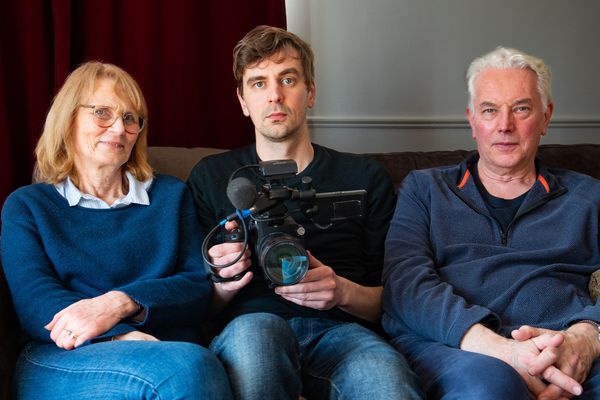Eye For Film >> Movies >> Silent Men (2024) Film Review
Silent Men
Reviewed by: Andrew Robertson

Given its subject it's appropriate that Silent Men starts with a content warning. It's equally appropriate that its website has a link to resources for those who recognise the issues it covers, at whatever stage they've reached. You can find that here and if you are among the men for whom the subtitle of The Awkward Art of Expressing Emotion rings true then it's worth a look.
If you're in a workplace in Scotland there's a chance you have participated in Public Health Scotland's Mental Health First Aid course. When I had the privilege of attending they talked about its origins as a part of an effort at suicide prevention. We also talked about stigma mental health, and one of the key parts of the training is 'the suicide question'. To elide or obfuscate it as a risk that someone may pose to themselves is to do them a disservice. If you're concerned someone, ask. It's not an easy question, but few of the important ones are.

It's important to talk. It's important too to remember that mental health is no different than physical health. Going to a therapist should be as normal as going to a physiotherapist. The ways we recover from physical traumas can leave us vulnerable in different ways. The ways we work around emotional issues can leave us open to further injury.
It doesn't have to be like that. A few years ago I saw a very different film that covered similar topics: Connect. Its director wanted to avoid it being labelled as wholly about the subject, but some topics distort the language around them. We use physical language for some of these things. I noted 'withdrawn', 'distance', 'barrier', 'bottled-up', and that's before any discussion of strength. We use that phsyical language for emotional and mental wellbeing but sometimes it feels that normalising ways of treating them is a step too far.
I'm already falling into a trap that I've fallen into before where I spend more time talking about the subject than the film. Anyone who's had the pleasure of catching any of Duncan Cowles' work will recognise his distinctive style. He's given to a self-referentiality that challenges him as a person as much as it entertains audiences. After award-winning shorts the deadpan documentarian has made his feature début, and it's a delight.
With a limited cinematic release, this is in various senses a big deal. It deserves it too. Released on International Men's Day, it's screening in a series of venues where short film audiences will have seen his work before. I saw it thanks to an online screener. I'd love to claim that being able to see television and the HDMI-connected laptop was a tribute to Cowle's trademark multi-angle setups but it's got as much do with ethernet ports as aesthetic tropes.
These include interviews that become dialogues, Cowles as narrator, nods to habits that might be recognisable even if you've not seen him three bits of glass away from a terrarium's occupant. There's family too, the only film-makers I can think of who challenge the proportions of kin in the production of cinema are Francis Ford Coppola and Robert Rodriguez. There's at least as much depth here. it's not by accident that I reach for such singular talents. I'll watch anything by either of them, and I'll watch anything by Cowles.
I've oft remarked that the essence of good documentary is an interesting subject, presented in an interesting way. With a challenging topic it's right that Cowles' approach is challenging. This isn't like the tedious sad then happy, sad then happy of Super/Man which was more of the metronome than Metropolis. More than a decade ago, during the making of Soft Toffee, there was advice to go away and make it more experimental. They clearly did, and it definitely worked. At the time I said I looked forward to more from those involved, and anticipation makes this all the better.
Literally years in the making - indeed, with home videos of the director included, possibly a life-time - it constantly compels. There's a significant moment where the film gathers itself, but it's less intermission than another chance for introspection. Coincidence meant it was also a time of interruption. My landline rang and as I went to answer it I hurriedly checked my other phone to see if I'd missed a call. I was thinking about my own family too, my mum, my dad, my siblings, my partner.
Wrestling with relationships is something too many people do alone, despite the inherent impossibility. Even Billy Idol needed the help of three guitarists, another songwriter and a producer to dance by himself. Cowles might be his own cameramen, narrator, sound recordist and more but he's also not alone. Not as a filmmaking talent, nor as a person. As part of a wave of Scottish documentarians given to intensely personal works. It has been fascinating to watch maturation of talents, to see the ways that the remove of filmmaking has created and bridged gaps.
With a few bits of strong language there's a good chance that this won't be screened for school age audiences. It's not aimed at them though. Indeed the group most at risk in Scotland is men between the ages of 25 and 44. I left that cohort a wee while ago, but know plenty who haven't yet, who never will. To make sense of one's place in the world it helps to have a sense of self, of surroundings, but what makes that easiest is sharing insights. Silent Men is an entreaty to talk, to share, and I am telling you to see it.
Reviewed on: 18 Nov 2024














